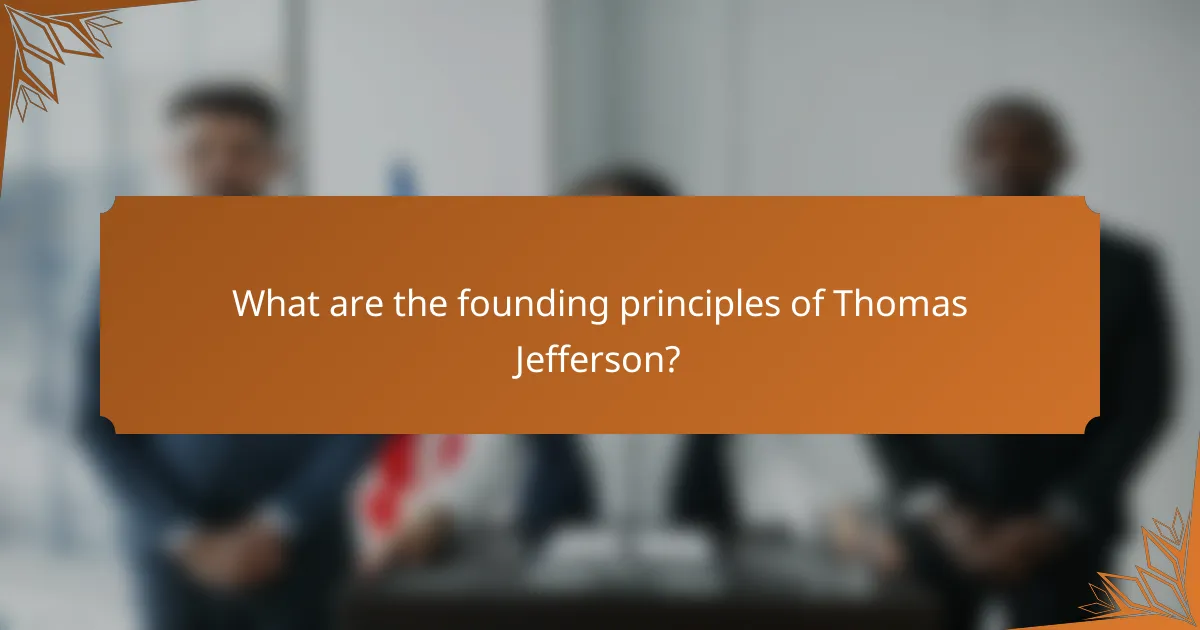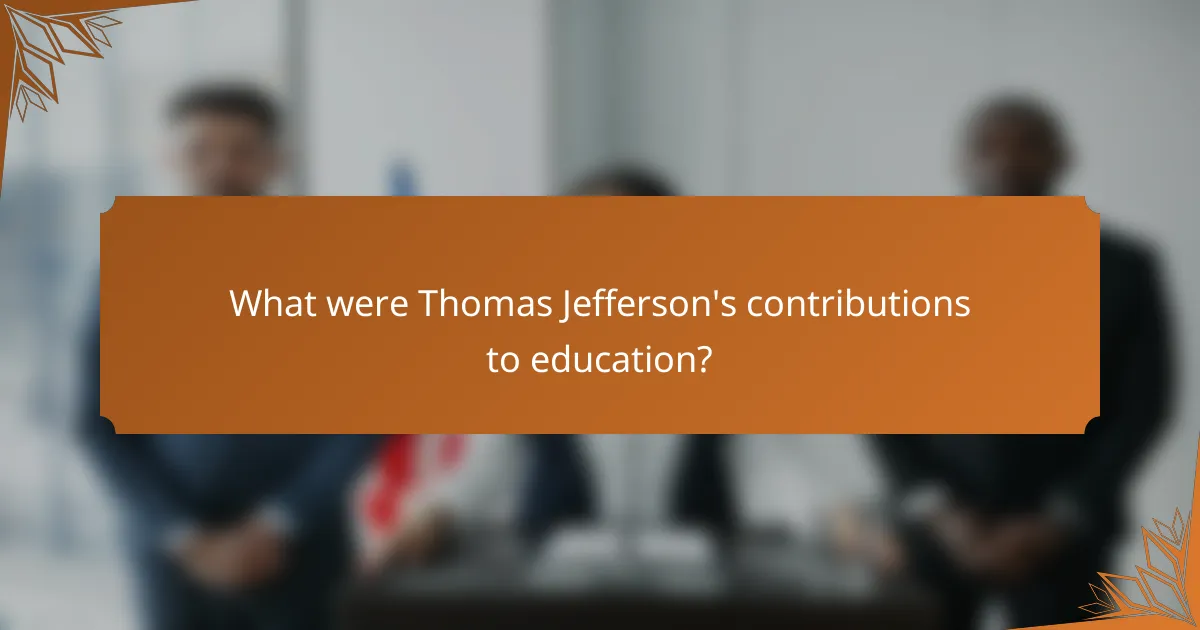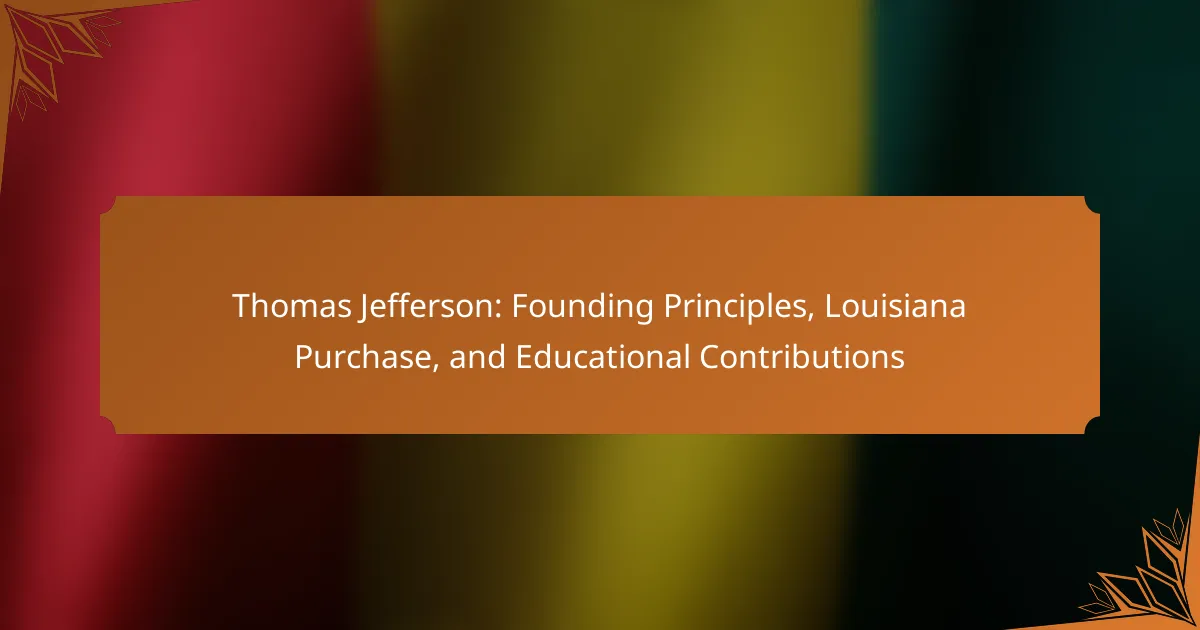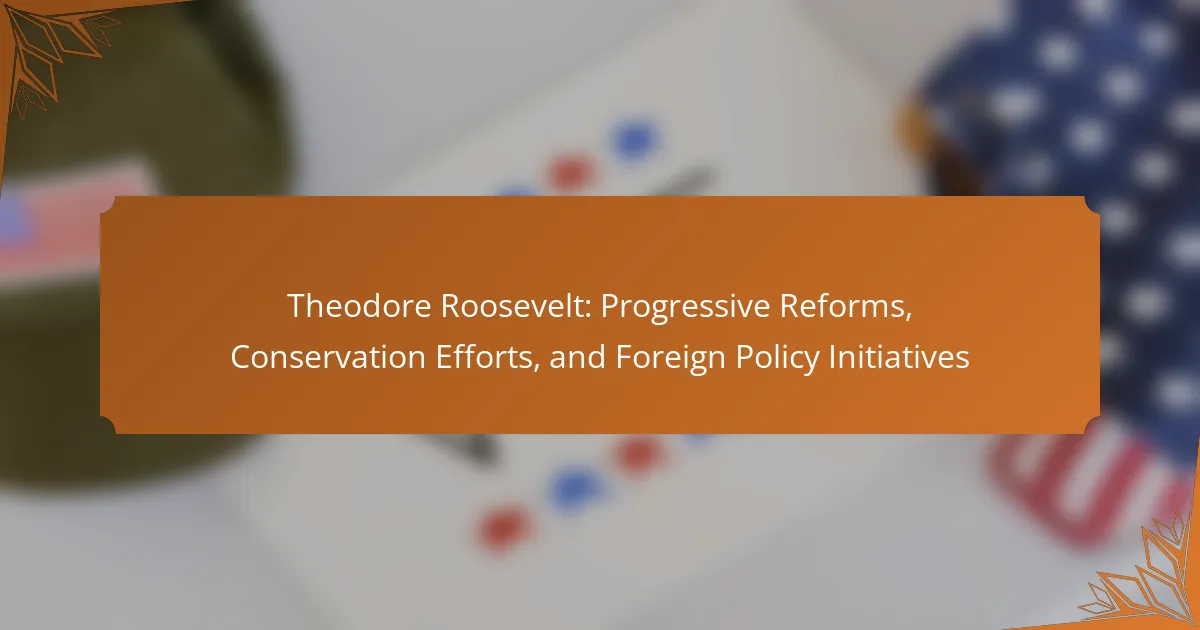Thomas Jefferson was a pivotal figure in American history, known for his founding principles of individual liberty, the separation of church and state, and the pursuit of happiness. His authorship of the Declaration of Independence encapsulated these ideals, asserting that all men are created equal and possess unalienable rights. Jefferson’s presidency marked significant milestones, including the Louisiana Purchase in 1803, which doubled the size of the United States and facilitated westward expansion. Additionally, he made substantial contributions to education by advocating for public schooling, drafting the Virginia Statute for Religious Freedom, and founding the University of Virginia, thereby influencing the development of the modern public education system in America.

What are the founding principles of Thomas Jefferson?
The founding principles of Thomas Jefferson include individual liberty, separation of [censured] and state, and the belief in the pursuit of happiness. Jefferson emphasized the importance of personal freedom in his writings. He argued that government should protect individual rights. The Declaration of Independence, authored by Jefferson, reflects these ideals. It states that all men are created equal and have unalienable rights. Jefferson also advocated for a secular government. He believed that religion should not influence political decisions. His principles laid the groundwork for American democracy.
How did Jefferson’s beliefs shape American democracy?
Jefferson’s beliefs significantly shaped American democracy through his advocacy for individual rights and limited government. He emphasized the importance of personal liberty and the pursuit of happiness. Jefferson’s authorship of the Declaration of Independence articulated these principles, asserting that all men are created equal. He championed the separation of [censured] and state, promoting religious freedom as a core democratic value. Jefferson’s vision of an educated citizenry was pivotal; he believed that informed citizens were essential for a functioning democracy. His support for public education laid the groundwork for future educational reforms. Additionally, Jefferson’s commitment to agrarianism influenced land policies and westward expansion, reinforcing the idea of democracy rooted in land ownership. His presidency also saw the Louisiana Purchase, which doubled the size of the nation and promoted democratic ideals through expansion. These elements collectively illustrate how Jefferson’s beliefs fundamentally shaped the framework of American democracy.
What key philosophies did Jefferson advocate for?
Thomas Jefferson advocated for several key philosophies. He strongly believed in individual liberty and the rights of man. Jefferson emphasized the importance of democracy and self-governance. He was an advocate for religious freedom and separation of [censured] and state. Jefferson also promoted the idea of an educated citizenry as vital for democracy. His writings reflect Enlightenment principles, particularly reason and scientific inquiry. Jefferson’s Declaration of Independence embodies his commitment to human rights. He believed in the pursuit of happiness as a fundamental right. These philosophies have had a lasting impact on American political thought.
How did Jefferson’s views on individual rights influence his policies?
Thomas Jefferson’s views on individual rights significantly shaped his policies. He believed in the inherent rights of individuals, which influenced his advocacy for the Declaration of Independence. Jefferson emphasized liberty, equality, and the pursuit of happiness. These principles guided his opposition to tyranny and support for democratic governance. His belief in limited government aimed to protect individual freedoms. Jefferson’s policies, such as the Louisiana Purchase, expanded territory while promoting the agrarian ideal, which he associated with individual independence. Additionally, his support for public education stemmed from the idea that informed citizens are essential for a functioning democracy. These actions reflected his commitment to safeguarding individual rights throughout his presidency.
Why is the Declaration of Independence significant to Jefferson’s legacy?
The Declaration of Independence is significant to Jefferson’s legacy because he authored the document. This pivotal text articulated the American colonies’ desire for independence from British rule. It established fundamental principles of individual rights and government accountability. Jefferson’s eloquent expression of these ideas influenced democratic movements worldwide. The Declaration is regarded as a cornerstone of American political philosophy. Jefferson’s role in its creation solidified his reputation as a key architect of American democracy. This document remains a symbol of liberty and justice. Its enduring impact on American identity is a testament to Jefferson’s vision and leadership.
What role did Jefferson play in drafting the Declaration?
Thomas Jefferson was the principal author of the Declaration of Independence. He was selected by the Continental Congress in June 1776 to draft the document. Jefferson’s writing articulated the colonies’ reasons for seeking independence from Britain. He emphasized natural rights and the social contract in his prose. The Declaration was adopted on July 4, 1776. Jefferson’s influence shaped the foundational principles of American democracy. His eloquent expression of liberty and equality resonated widely. This role established him as a key figure in American history.
How did the Declaration reflect Jefferson’s core values?
The Declaration of Independence reflects Jefferson’s core values by emphasizing individual rights and the pursuit of liberty. Jefferson believed in the innate rights of individuals, stating that “all men are created equal.” He articulated the importance of government deriving its power from the consent of the governed. The document also highlights the right to alter or abolish oppressive governments. Jefferson’s commitment to Enlightenment ideals is evident in his advocacy for reason and rational thought. He viewed education as essential for informed citizenship, which is reflected in the Declaration’s call for a just society. These principles align with Jefferson’s vision of democracy and personal freedom.
What impact did Jefferson’s principles have on future generations?
Jefferson’s principles significantly influenced future generations by promoting individual rights and democratic governance. His Declaration of Independence emphasized the idea that all men are created equal. This assertion laid the groundwork for civil rights movements in America. Jefferson’s advocacy for religious freedom shaped the separation of [censured] and state. This principle remains vital in contemporary governance. His vision of an educated citizenry led to the establishment of public education systems. These systems fostered informed participation in democracy. Jefferson’s ideals inspired global movements for liberty and self-determination. His legacy continues to resonate in discussions about human rights and governance today.
How have Jefferson’s ideas been interpreted in modern politics?
Jefferson’s ideas have been interpreted in modern politics as foundational to democracy and individual rights. His emphasis on liberty and personal freedoms influences contemporary discussions on civil rights. The Declaration of Independence, authored by Jefferson, serves as a reference for social justice movements. Jefferson’s vision of government promoting the common good informs current policy debates on public welfare. His advocacy for education shapes modern views on access to education as a right. Political leaders often invoke Jefferson’s principles to support democratic governance. The tension between federal and state powers, which Jefferson addressed, remains relevant in current political discourse. His ideas continue to inspire debates on the balance between security and liberty in governance.
What controversies surround Jefferson’s legacy today?
Thomas Jefferson’s legacy is surrounded by controversies regarding his views on slavery and race. Jefferson owned over 600 slaves during his lifetime, which raises ethical questions about his commitment to liberty. He wrote that “all men are created equal” in the Declaration of Independence, yet he did not apply this principle to enslaved individuals. Historical accounts show that he fathered children with Sally Hemings, a slave, further complicating his legacy. Critics argue that Jefferson’s actions contradict his philosophical ideals. Additionally, his policies as president, including the Louisiana Purchase, have been scrutinized for their impact on Native American populations. These factors contribute to ongoing debates about how to interpret Jefferson’s contributions to American history.

What was the significance of the Louisiana Purchase?
The Louisiana Purchase was significant because it doubled the size of the United States. This acquisition occurred in 1803 when the U.S. bought approximately 828,000 square miles from France. It provided access to vital waterways, including the Mississippi River. The purchase facilitated westward expansion, which was a key aspect of Manifest Destiny. It also encouraged agricultural development and settlement in the new territories. The deal was negotiated by President Thomas Jefferson, who believed it was essential for the nation’s growth. The cost of the purchase was about $15 million, making it a substantial investment. This transaction is considered one of the most important achievements of Jefferson’s presidency.
How did the Louisiana Purchase change the United States?
The Louisiana Purchase significantly expanded the territory of the United States. Acquired in 1803, it added approximately 828,000 square miles. This purchase doubled the size of the nation at the time. It provided access to vast natural resources and land for agriculture. The acquisition also facilitated westward expansion and the idea of Manifest Destiny. Additionally, it strengthened the United States’ position in North America. The purchase was negotiated by President Thomas Jefferson for $15 million. This transaction is considered one of the most important in American history.
What were the motivations behind the acquisition of this territory?
The motivations behind the acquisition of the Louisiana Territory were primarily economic and strategic. Thomas Jefferson aimed to secure land for agricultural expansion. The acquisition would ensure access to the Mississippi River for trade. It would also provide land for future generations of Americans. The purchase was seen as essential for the nation’s growth. Additionally, it aimed to prevent European powers from encroaching on American territory. The deal doubled the size of the United States, enhancing its geopolitical power. Jefferson believed in the agrarian vision of a nation of independent farmers. Thus, the Louisiana Purchase aligned with his vision of American democracy and prosperity.
How did the Purchase affect American expansionism?
The Louisiana Purchase significantly accelerated American expansionism. This acquisition, completed in 1803, doubled the size of the United States. It provided access to vast territories rich in resources. The purchase also facilitated westward migration and settlement. American pioneers moved into the newly acquired lands, seeking new opportunities. This movement was driven by the belief in Manifest Destiny. The purchase laid the groundwork for future territorial acquisitions. It ultimately shaped the nation’s geography and growth trajectory.
What challenges did Jefferson face during the Louisiana Purchase?
Jefferson faced significant constitutional challenges during the Louisiana Purchase. The U.S. Constitution did not explicitly grant the president the authority to acquire new territory. Jefferson, a strict constitutionalist, grappled with this interpretation. He worried that the purchase might overstep federal powers. Additionally, the financial implications posed a challenge. The cost of $15 million raised concerns about national debt. Jefferson also faced political opposition from Federalists. They criticized the purchase as unconstitutional and a threat to the republic. Furthermore, the vastness of the territory created logistical challenges for governance. This included issues related to land management and integration into the Union.
How did Jefferson navigate constitutional concerns regarding the Purchase?
Jefferson navigated constitutional concerns regarding the Louisiana Purchase by interpreting the Constitution broadly. He believed that the power to acquire territory was implied under the treaty-making powers granted to the president. Jefferson justified the Purchase as a means to promote national expansion and security. He argued that the acquisition would benefit the nation economically and politically. To address concerns, he sought Congressional approval after the fact. The Senate ratified the treaty in October 1803, solidifying the Purchase legally. Jefferson’s actions reflected a pragmatic approach to governance. His decisions ultimately expanded the United States significantly.
What were the reactions of Congress and the public to the Purchase?
The reactions of Congress and the public to the Louisiana Purchase were mixed. Congress initially debated the constitutional implications of the Purchase. Some lawmakers supported it for its potential to expand the nation. Others criticized it, arguing it overstepped presidential authority. Public reaction varied widely as well. Many Americans were excited about the new land and opportunities. Others expressed concerns about the impact on Native American populations and slavery. Overall, the Purchase sparked significant political discourse and division.
What were the long-term effects of the Louisiana Purchase on U.S. history?
The long-term effects of the Louisiana Purchase on U.S. history include territorial expansion and increased economic opportunities. The acquisition in 1803 doubled the size of the United States. It provided access to valuable resources and land for agriculture. This expansion facilitated westward migration and settlement. The purchase also intensified debates over slavery in new territories. It contributed to the emergence of sectional tensions leading to the Civil War. Additionally, it established the precedent for future U.S. territorial acquisitions. The Louisiana Purchase significantly shaped the nation’s geopolitical landscape.
How did the Purchase influence relations with Native American tribes?
The Louisiana Purchase significantly impacted relations with Native American tribes. It expanded U.S. territory, leading to increased settlement and encroachment on Native lands. This expansion often resulted in conflicts as settlers moved into areas traditionally occupied by tribes. The U.S. government pursued policies aimed at assimilation, which altered tribal cultures and lifestyles. Treaties were frequently made and broken, undermining trust between tribes and the government. The Purchase ultimately intensified pressures on Native American communities, leading to forced removals and loss of sovereignty. Historical events, such as the Indian Removal Act of 1830, further illustrate these consequences.
What role did the Louisiana Purchase play in shaping U.S. foreign policy?
The Louisiana Purchase significantly expanded U.S. territory, impacting foreign policy. This acquisition, finalized in 1803, doubled the size of the United States. It provided the nation with vast resources and strategic land. The purchase also established the U.S. as a formidable continental power. This shift encouraged westward expansion and manifest destiny. Furthermore, it led to increased tensions with foreign nations, particularly Britain and Spain. The U.S. sought to assert its influence in North America. Overall, the Louisiana Purchase laid the groundwork for future diplomatic negotiations and territorial claims.

What were Thomas Jefferson’s contributions to education?
Thomas Jefferson significantly contributed to education by advocating for public schooling and educational reform. He proposed a system of public education in Virginia, emphasizing the importance of education for a democratic society. Jefferson believed that education should be accessible to all, regardless of social status. He drafted the Virginia Statute for Religious Freedom, which influenced the separation of [censured] and state in education. Jefferson founded the University of Virginia in 1819, which was the first university in the United States to be designed specifically for undergraduate education. He also promoted the idea of a merit-based system in education, where individuals could advance based on their abilities. His vision laid the groundwork for the modern public education system in America.
How did Jefferson’s vision influence American education systems?
Thomas Jefferson’s vision significantly influenced American education systems by advocating for public education and the establishment of a secular curriculum. He believed that education was essential for an informed citizenry and the preservation of democracy. Jefferson proposed a system of public schools to provide free education to all children, regardless of their background. This idea laid the foundation for universal education in the United States. He also emphasized the importance of a well-rounded education, including subjects like science, philosophy, and the arts. Jefferson’s advocacy for education reforms led to the creation of state-sponsored universities, such as the University of Virginia, which he founded in 1819. His vision promoted the idea that education should be accessible and relevant to all, shaping the modern American education system.
What educational reforms did Jefferson advocate for?
Thomas Jefferson advocated for several key educational reforms. He believed in the establishment of a public education system. Jefferson proposed free education for all white male children. He emphasized the importance of education in fostering informed citizens. Jefferson also supported the idea of a state university. This university would provide higher education opportunities. He argued that education should be accessible to all, not just the wealthy. Jefferson’s ideas laid the groundwork for future public education systems in America.
How did Jefferson’s ideas about education reflect Enlightenment principles?
Jefferson’s ideas about education reflected Enlightenment principles by emphasizing reason, individualism, and the importance of knowledge. He believed education was essential for a functioning democracy. Jefferson advocated for public education to promote informed citizenship. He argued that an educated populace could think critically and make rational decisions. This aligns with Enlightenment beliefs that knowledge empowers individuals. Jefferson’s establishment of the University of Virginia exemplified his commitment to education. He designed it to foster free inquiry and intellectual development. His vision was rooted in the Enlightenment ideal that education could improve society.
What institutions did Jefferson help establish to promote education?
Thomas Jefferson helped establish the University of Virginia to promote education. He founded this institution in 1819. Jefferson designed the university’s curriculum and architecture. He emphasized the importance of higher education for a democratic society. Jefferson believed education was essential for informed citizenship. The university became a model for public higher education in the United States. Additionally, Jefferson advocated for public education systems in Virginia. His efforts laid the groundwork for future educational reforms.
How did the University of Virginia embody Jefferson’s educational philosophy?
The University of Virginia embodies Jefferson’s educational philosophy through its emphasis on liberal arts and public education. Jefferson believed in the importance of an educated citizenry for a functioning democracy. He founded the university in 1819 with a vision of promoting knowledge and civic responsibility. The curriculum focused on a broad range of subjects, encouraging critical thinking and ethical reasoning. Jefferson designed the university’s architecture to reflect openness and accessibility. He also advocated for the inclusion of diverse disciplines, such as science, humanities, and social studies. This holistic approach aimed to develop well-rounded individuals. The university remains a testament to his ideals, fostering intellectual growth and public service.
What role did public education play in Jefferson’s vision for America?
Public education was central to Thomas Jefferson’s vision for America. He believed that an informed citizenry was essential for a functioning democracy. Jefferson advocated for a system of public education to promote equality and opportunity. He proposed that education should be accessible to all, regardless of social class. Jefferson argued that educated individuals would make better decisions in governance. He established the University of Virginia to exemplify his educational ideals. Jefferson’s vision included a curriculum that encouraged critical thinking and civic responsibility. His efforts laid the groundwork for future public education systems in the United States.
What lessons can we learn from Jefferson’s approach to education?
Jefferson’s approach to education emphasizes the importance of accessible education for all citizens. He believed that an educated populace is essential for a functioning democracy. Jefferson advocated for public education funded by the state. He established the University of Virginia, promoting higher education and intellectual freedom. Jefferson also valued critical thinking and self-education. He encouraged lifelong learning and the pursuit of knowledge. His efforts laid the groundwork for modern public education systems. Jefferson’s vision illustrates the connection between education and civic responsibility.
How can Jefferson’s educational principles be applied today?
Jefferson’s educational principles can be applied today by emphasizing the importance of public education. He believed that an informed citizenry is vital for democracy. Jefferson advocated for a system that promotes critical thinking and civic responsibility. This can be implemented through curricula that encourage analytical skills and ethical reasoning.
Furthermore, Jefferson supported the idea of education being accessible to all, regardless of socioeconomic status. Modern educational policies can reflect this by ensuring equitable funding and resources for schools in underserved communities.
His emphasis on lifelong learning can also guide [censured] education programs today. This approach fosters a culture of continuous improvement and adaptability in a rapidly changing world.
Overall, applying Jefferson’s principles today involves promoting inclusivity, critical thinking, and lifelong learning in education systems.
What are the best practices for fostering an educational environment inspired by Jefferson?
Encouraging critical thinking is a best practice for fostering an educational environment inspired by Jefferson. Jefferson believed in the importance of education for informed citizenship. Implementing discussion-based learning allows students to engage with ideas actively. Providing access to diverse resources supports independent research and inquiry. Promoting civic engagement connects education to real-world issues. Encouraging collaboration among students fosters a sense of community. Supporting lifelong learning reflects Jefferson’s belief in continuous education. Creating an inclusive environment ensures all voices are heard and respected. These practices align with Jefferson’s vision for an educated populace.
Thomas Jefferson, a key figure in American history, is known for his founding principles that emphasize individual liberty, the separation of [censured] and state, and the pursuit of happiness. His authorship of the Declaration of Independence laid the groundwork for American democracy and influenced future generations. The article explores Jefferson’s significant contributions, including the Louisiana Purchase, which doubled U.S. territory, and his advocacy for public education, which established a foundation for modern educational systems. Additionally, it addresses the complexities and controversies surrounding Jefferson’s legacy, particularly regarding slavery and race relations.



